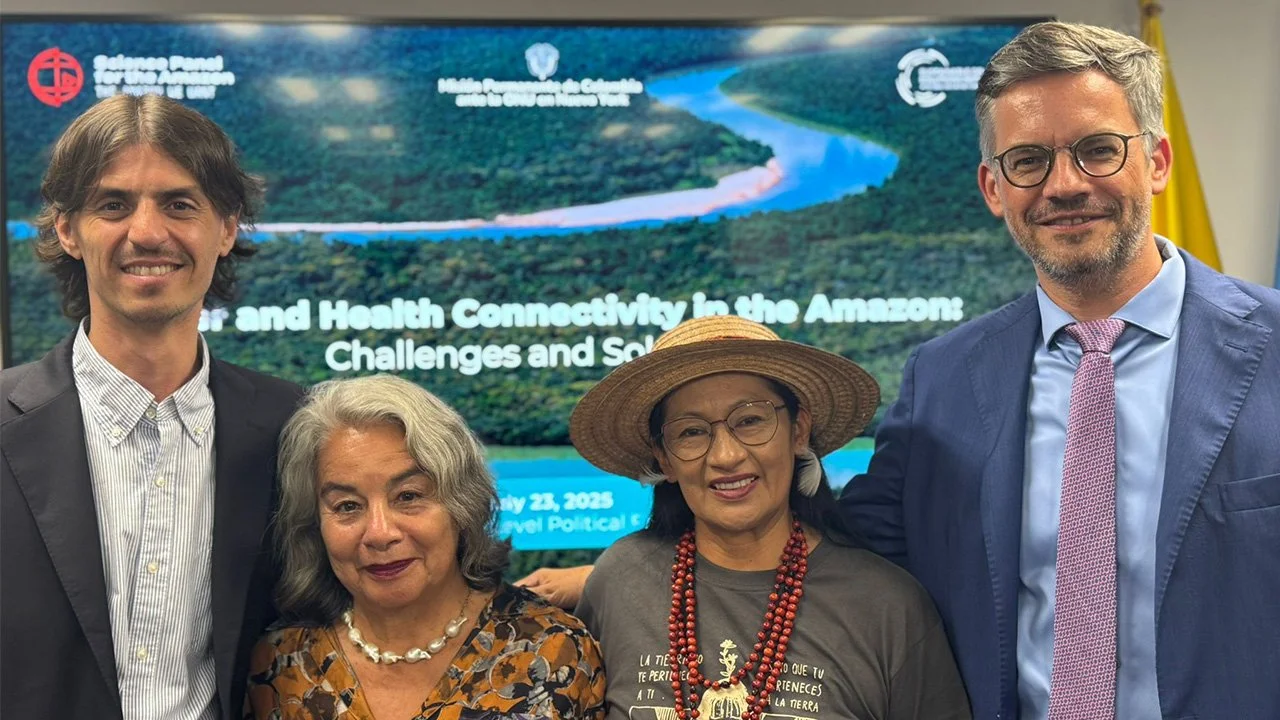Health, Water and Partnerships: a SPA Conversation at HLPF
The Science Panel for Amazon (SPA), in partnership with the Permanent Mission of Colombia to the United Nations, held a high-level panel meeting on July 23, 2025, entitled Water and Health Connectivity in the Amazon: Challenges and Solutions. The event, hosted at the Colombian Mission in New York, aligned with this year’s High-Level Political Forum (HLPF) review of SDGs 3 (Health), 14 (Life Below Water), and 17 (Partnerships).
The Amazon is a foundational pillar of health and water security for the region and beyond. Home to over 47 million people, including 2 million Indigenous Peoples, as well as Local Communities, the health of the Amazon’s forests and rivers is critical for the well-being of its inhabitants across the region. As such, the panel featured insights from SPA Policy Briefs on health and water, offering science-based, policy-relevant recommendations to address the socio-environmental challenges impacting Amazonian peoples and ecosystems.
Opening remarks were delivered by Deputy Permanent Representative H.E. Ambassador Raúl Esteban Sánchez Niño, who spoke about the necessary transboundary work to ensure the right to a healthy life in a healthy territory. He said, “The future of the Amazon must be built through regional dialogue, cooperation, and respect for the diversity of perspectives and realities that shape our shared biome.” Ambassador Sánchez Niño’s remarks were followed by a panel discussion moderated by Emma Torres, SDSN’s VP for the Americas and the SPA’s Strategic Coordinator.
Dr. Gloria Rivera, SPA Lead Author
The panel began with a presentation from Dr. Gloria Rivera, Lead Author of the SPA Policy Brief, “Health in the Amazon: Environmental, Social and Economic Challenges”. Dr. Rivera spoke about the health challenges in the Amazon region and the importance of opening the door to the knowledge of Indigenous Peoples. She expressed: “I am here representing the voices of the local and Indigenous population, who are currently worried about the health of the Amazon region, and giving a voice to those environmental, social, and economic challenges that we face day-to-day”.
Dr. Rivera noted that when speaking about health, it is important to consider what health means to Indigenous Peoples and Local Communities. “For Indigenous Peoples, health is a state of well-being—a state that allows us to live in reciprocity and gratitude for everything around us. It is about reflecting on what unites us as people,” she said. Global conversations require a shift in perspective to better understand the connection between people, nature, and spirituality in the Amazon. Understanding this holistic view is essential to joining forces and taking action to address the consequences of climate change.
Dr. Sebastian Heilpern, SPA Author
Following this presentation, Dr. Sebastian Heilpern, SPA Author and incoming Assistant Professor in Earth System Science at Stanford University, spoke about water: the Amazon is a massive freshwater ecosystem and a source for food and energy, affecting health and global partnerships. His remarks drew on the SPA Policy Brief “Conserving Amazon's Freshwater Ecosystem's Health and Connectivity.”
Dr. Heilpern stressed the deep connection between water and health for Amazonians, addressing crucial topics such as food security. “An aspect of food security is that more diverse diets lead to better nutrition. The report found that people who eat more fish, and a greater diversity of fish, tend to have better nutritional status,” he explained.
He went on to highlight this connectivity, noting that changes in food systems drive changes in biodiversity, for example, the overexploitation of fish species from extracting too much biomass, or the fragmentation of rivers caused by dams. He also recognized the importance of community fisheries and other sustainable activities in conserving water’s health and connectivity: “One way to support life below water is by using community-based management groups and empowering people through their communities.”
Dr. Erwin de Nys Manager for the Environmental Unit in Latin America & the Caribbean at the World Bank
Lastly, Dr. Erwin De Nys, Manager for the Environmental Unit in Latin America & the Caribbean at the World Bank, gave examples of how the World Bank connects all eight Amazon countries to strengthen conservation, promote sustainable livelihoods, restore degraded areas, and foster cross-border cooperation and governance. Dr. De Nys shared his concern for the Amazon, mentioning that while the Amazon forest is a hotspot of biodiversity and natural wealth, it is also home to some of the highest poverty levels in the region; nearly 40% of the population lives below the poverty line. “Ethnic minorities and women, people living in remote areas face even greater challenges, higher poverty, worse health outcomes, and lower literacy rates; so the Amazon is not just an environmental issue, it’s a development issue, It's a health issue, and it's a justice issue”, he exclaimed.
Dr. De Nys also reflected on the key role that partnerships have to address these issues. He stated that fragmented action will not save the Amazon, but regional cooperation and partnerships can. He closed his intervention with a motivating call: “Let's scale what works and fund what matters, and let's make sure that the Amazon people, especially Indigenous communities, women and youth, are not just beneficiaries but leaders in this transformation.”
The presentations were followed by a panel discussion, during which the audience shared thoughtful reflections. Key interventions from representatives of the UN Permanent Missions to Bolivia and Portugal sparked a strong dialogue among the speakers about the shared commitments of Amazonian countries and beyond. They emphasized the importance of investment in science and technology, each country’s climate and adaptation commitments, and the recognition of the rights of nature and Indigenous Peoples.
A key takeaway from the session was the deep interconnection between Amazonian health, viewed through a One Health lens, and water connectivity, highlighting the crucial role of the Amazon’s freshwater systems in maintaining regional hydrological balance and influencing marine ecosystems. The discussion also underscored the essential role of international partnerships in conserving this connectivity sustainably, ensuring the resilience of the world’s largest tropical forest.




